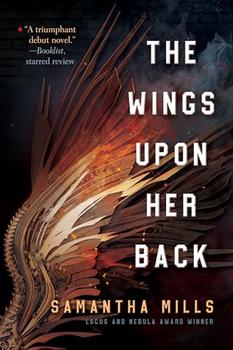Summary | Excerpt | Reviews | Beyond the book | Read-Alikes | Genres & Themes | Author Bio

Faith is a delicate thing. At its best, it can offer peace in times of crisis. At its worst, it can be a factor in breeding dissension, causing wars, and ruining lives. In Samantha Mills' novel The Wings Upon Her Back, it is the axis on which the world turns, and belief in the wrong thing can mean the end of your existence.
In the beginning, the people in the city of Radezhda carved out a meager existence as best they could. Then the gods came. Five ethereal beings descended from the sky, possessed of undreamt of technologies and knowledge that they gifted to the people: The creator, the scholar, the worker, the earth god, and the mecha god — the god of warriors. The people devoted themselves to these beings until one day the gods turned their backs and went to sleep, leaving only five favored disciples to act as their Voices.
Since she was a child, it was scholar Zenya's dream to join the Winged, the elite flying warriors who defended the city and kept the peace in service of the mecha god. Though raised to revere the scholar god, she wanted nothing more than to devote her life to protecting the people of Radezhda. For two years she worked in secret, building her strength for the trials that might earn her a place in the ranks and maybe one day give her wings of her own.
Winged Zemolai devoted every waking moment to the mecha god and her Voice. For twenty-six grueling years, she struck down heretics who denied the god's divinity, demolished towns, killed unbelievers. She turned her back on everyone she loved and risked her life to make the mecha god the one true god of Radezhda. But after a fleeting second of doubt, she is stripped of everything that gave her purpose. When she is found by a group of fledgling revolutionaries who want her help to free the world from the rule of sleeping gods, she must decide if she is strong enough to believe in something else.
This extraordinary book examines the faith of one woman at two different turning points in her life. The child Zenya renounces familiarity and family to answer the call of a god she believes in with every fiber of her being, only to learn that there is still more she must give up to prove herself. The jaded, broken warrior Zemolai, cast off after one misguided act of mercy, is faced with a reckoning that threatens to shatter her once rock-solid faith entirely. What Mills does so expertly is elicit the same level of empathy from the reader for a woman at two wildly different life stages. In alternating chapters, we watch both journeys: the child learning that her fantasies of heroism are not everything she dreamed and the woman coming to terms with those dreams finally and forever breaking up around her in the face of a darker but necessary truth. The reader pines for Zenya to allow room for doubt into a worldview rapidly spiraling into zealotry and for wounded Zemolai to allow herself to grieve for the faith she is losing.
While we are never left in any doubt about the reality of Radezhda's gods, we are also never in doubt that Zenya's faith is sincere and Zemolai's pain is genuine. But this is not a book about the nature of god, if god exists, or what "god" is to every individual. It is a book that explores what happens when we are confronted with a reality entirely opposed to what we have always believed to be true. How do we survive that crisis of faith and begin to live in a world without the comfort, protection, and guidance that system has afforded us?
Radezhda is a rich, darkly rendered, harrowing world and it is impossible not to think of the devastated streets and refugees of real cities destroyed today in conflicts with religious roots. However, Mills does not linger overlong on tragedy. She is more invested in conveying the power of critical thought and agency in overcoming the more simplistic beliefs of a system that promises to take care of you as long as you remember your place, and the joy that can come from seeing the world through clear eyes. The "heretics" don't really care what the truth is about Radezhda's sleeping gods; they simply want the right to think and decide for themselves what they believe.
Though its battle scenes are riveting and the drama nail-bitingly intense, The Wings Upon Her Back is ultimately a story of redemption. Religion is not inherently evil. Faith in something bigger than ourselves can be invaluable. What Mills wants to remind us is that faith should never take the place of reason. Any branch of a faith that calls its followers heretics if they express doubt or ask questions is not one that seeks the betterment of its believers. We can believe in a higher power and still trust in our own innate moral compass. It is possible to do good in the world for the sake of doing good, not because we are told it is what we must do. This book will resonate deeply with believers and nonbelievers and will leave its readers with much to think about.
![]() This review
first ran in the June 5, 2024
issue of BookBrowse Recommends.
This review
first ran in the June 5, 2024
issue of BookBrowse Recommends.

If you liked The Wings Upon Her Back, try these:

by Joshua Yaffa
Published 2021
From a leading journalist in Moscow and correspondent for The New Yorker, a groundbreaking portrait of modern Russia and the inner struggles of the people who sustain Vladimir Putin's rule.

by Margaret Atwood
Published 2020
In this brilliant sequel to The Handmaid's Tale, acclaimed author Margaret Atwood answers the questions that have tantalized readers for decades.
Your guide toexceptional books
BookBrowse seeks out and recommends the best in contemporary fiction and nonfiction—books that not only engage and entertain but also deepen our understanding of ourselves and the world around us.